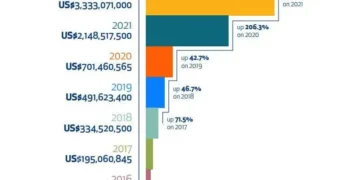Siren-like alarm to hit nearly every mobile in Britain at 3 pm on September 7 – the biggest test yet of a system designed to keep citizens safe in an age of storms, bombs, and global uncertainty.
By Nuel Jones, Senior Reporter, London – News Global TV
London, 5th September 2025.
At precisely 3:00 pm this Sunday, the air across Britain will briefly reverberate with an unfamiliar, almost unnerving sound. Not from church bells, factory horns, or the roar of RAF jets, but from the tiny speakers of the devices we carry everywhere: our mobile phones.
Tens of millions of them – from Aberdeen to Cornwall, Belfast to Cardiff – will vibrate and blare in unison, emitting a sharp, siren-like alarm lasting ten seconds. The sound will cut through living rooms, high streets, train carriages, quiet pubs, and even Sunday afternoon gardens. It will override silent mode, break through “Do Not Disturb” settings, and bring with it a stark message:
“This is a test of the UK Emergency Alerts system. No action is needed.”
For some, it will be a mild curiosity, shrugged off and quickly forgotten. For others – especially the unprepared – it may provoke shock, annoyance, or even panic. But for the British government, this nationwide drill represents something much bigger: the country’s most ambitious attempt yet to ensure its citizens can be warned, instantly and effectively, when disaster strikes.
Why Sunday? Why Now?
The choice of Sunday, 7 September, is not random. Ministers and civil servants debated dates carefully, aiming to minimise disruption. With the men’s Premier League football calendar on pause for international fixtures, the nation’s sporting focus is lighter. Schools are not in session. For many, it is a day of rest.
But as Pat McFadden, the Cabinet Office minister responsible for resilience, admitted this week: “There’s no perfect time to do these things. There will always be weddings, funerals, birthday parties, church services. Something will always be disturbed. But it’s better to test and be ready than to be unprepared in a crisis.”
That crisis could come in many forms. In recent years, the UK has faced unprecedented flooding, heatwaves, storms, and even the evacuation of thousands when a 500kg unexploded Second World War bomb was unearthed in Plymouth. Globally, the war in Ukraine, cyber-attacks, and climate-driven disasters have sharpened fears about national resilience.
A Cabinet Office document, the Resilience Action Plan, released in July, bluntly warned: “The whole of the UK’s national resilience – our economy, defences, and biosecurity – is being tested like never before.”
How the Alert System Works
The UK Emergency Alerts system uses a technology called cell broadcasting. Unlike text messages, which are sent individually to phone numbers, alerts are transmitted to every device connected to a mast within a specific area. This means:
- No sign-up is needed. Anyone with a compatible device on 4G or 5G will receive the alert automatically.
- Location-specific warnings can be sent. If flooding threatens York, only Yorkshire residents need hear the alarm.
- Immediate mass reach. Officials estimate 95% of phones in active use can be reached simultaneously.
During Sunday’s test, nearly 87 million phones and tablets could be triggered.
Devices that won’t receive it include:
- Those switched off or in airplane mode.
- Older handsets limited to 2G/3G.
- Wi-Fi-only tablets.
For those affected, TV and radio broadcasts will also carry the test message. In extreme emergencies, traditional methods – from door-to-door police knocks to church bells – remain in play.
When Has It Been Used Before?
Although this will be the second nationwide test, the system has been used five times for real emergencies since its phased rollout in 2023. Among them:
- January 2025 – Storm Éowyn: A red weather warning saw 4.5 million people in Scotland and Northern Ireland receive alerts warning of risks to life.
- December 2024 – Storm Darragh: Severe flooding in Cumbria and Leicestershire triggered targeted alerts to local residents.
- February 2024 – Plymouth bomb: 50,000 phones received a message urging evacuation after a WWII bomb was discovered in a back garden.
- Summer 2023 – Heatwave: Local alerts warned vulnerable groups in southeast England of extreme temperatures and health risks.
The first UK-wide test in April 2023 was memorable for its teething issues. Some phones never rang. Others went off minutes late. A small number of handsets received garbled messages. Yet officials judged it a success, laying the groundwork for Sunday’s more ambitious drill.
Comparisons Abroad
The UK is catching up rather than leading.
- In the United States, the Federal Emergency Management Agency (FEMA) runs the Wireless Emergency Alerts (WEA) system, active since 2012. Americans receive alerts for Amber child abductions, hurricanes, wildfires, and national security threats.
- Japan has used earthquake and tsunami alerts for nearly two decades. The distinctive chime and on-screen warnings are credited with saving thousands of lives during the 2011 Tōhoku earthquake and tsunami.
- Across the European Union, various member states operate similar systems, mandated under EU law since 2018. Italy, the Netherlands, and Greece regularly test theirs.
Britain’s late adoption has been criticised by some experts. Dr. Hannah Walters, a disaster resilience specialist at King’s College London, told News Global TV: “We’ve been behind the curve. The technology has existed for years, but political will and investment lagged. Sunday’s test is an important step in closing that gap.”
Concerns and Criticism
Not everyone welcomes the alerts. Some privacy campaigners worry about government overreach, fearing the system could be misused for political propaganda. Ministers insist that is impossible: alerts are strictly limited to emergencies where lives are at risk.
More practical concerns abound:
- Drivers. Police warn that motorists must not pick up their phones when the siren sounds. Doing so could bring a £200 fine and six penalty points. Campaigners fear the test could trigger accidents.
- Domestic abuse survivors. For those secretly carrying hidden phones, an unexpected alarm could be dangerous. Charities have advised such individuals to switch devices to airplane mode or disable alerts in settings.
- Anxiety. Some psychologists warn the sound could cause panic, particularly among children, elderly people, or those with certain conditions such as PTSD.
The government has tried to soften the blow with a publicity campaign: posters at motorway services, announcements at train stations, and a British Sign Language information video. Still, the element of surprise cannot be entirely removed.
What the Public Thinks
Reactions are mixed.
In Tottenham, where this reporter spoke with residents ahead of the test, some welcomed the system.
“If it saves lives, I’m all for it,” said Sophie O’Donnell, 43, who lives near the River Lea and has been flooded twice in the last decade. “I’d rather be woken up by a siren than woken up by water in my living room.”
Others were sceptical. Michael, 27, a delivery driver, worried: “If my phone goes off when I’m on the A406, I could easily lose concentration. Feels risky.”
In Brixton, shopkeeper Ramesh Patel was philosophical: “It’s like a fire drill at work. Annoying, but necessary.”
Behind the Technology
The alerts rely on partnerships between government, mobile operators, and Ofcom. EE, O2, Vodafone, and Three have upgraded their networks to ensure messages can be transmitted quickly. Testing has included coverage in rural areas where signals are patchy.
Security is a priority. Officials stress the system cannot be hacked easily, as messages are sent via secure channels from the Cabinet Office. Yet in an era of escalating cyber warfare, experts acknowledge no system is invulnerable.
The Bigger Picture: National Resilience in 2025
The timing of the test reflects a wider government push on resilience. Lessons from the COVID-19 pandemic, extreme weather, and geopolitical instability have convinced ministers that the UK must plan more actively for shocks.
The July Resilience Action Plan drew attention to vulnerabilities ranging from energy supply to biosecurity. In its foreword, McFadden wrote: “War on the continent of Europe has catalysed the largest rearmament of European powers since World War II. Our national resilience is being tested like never before.”
The alerts system is one piece of that jigsaw, alongside stockpiling medical supplies, boosting flood defences, and enhancing cyber protections.
What Happens After Sunday?
If successful, Sunday’s test will not be the last. Officials plan annual national drills, alongside targeted regional alerts as needed. Some predict the system could expand to cover issues like terror attacks, chemical spills, or even national infrastructure failures.
But officials are cautious. “We have to maintain public trust,” said one Whitehall source. “If we overuse it, people will ignore it. If we underuse it, we risk lives. Striking that balance is vital.”
Conclusion: Alarm with a Purpose
At 3 pm on Sunday, Britain will pause. Phones will shriek. Conversations will stop. Some will frown, some will laugh, some may curse. But beneath the brief disruption lies a serious intent: to ensure that when the worst happens, a message of warning can cut through the noise of daily life and reach those who need it most.
For the government, the test is both symbolic and practical – a sign that in an era of uncertainty, from floods to bombs to pandemics, the state is at least trying to keep pace with risk. For the public, it is a reminder that preparedness is no longer optional.
As one Tottenham pensioner, Margaret Hughes, 72, put it with a wry smile: “If the world’s ending, I’d rather know about it than not. At least I’ll have time to put the kettle on.”
On Sunday afternoon, kettles may rattle on kitchen counters, dogs may bark in surprise, and startled drivers may tighten their grip on the wheel. But when the sirens fade and silence returns, Britain will have taken another small but significant step in the long, unfinished task of building resilience.
And that – ministers argue – is worth ten seconds of noise.
Nuel Jones, Senior Reporter, London – News Global TV
Stay Informed
For more updates on this developing story, visit News Global TV’s website: (https://news-globaltv.com) and also subscribe to our YouTube channel: (https://youtube.com/@newsglobal4free).


















